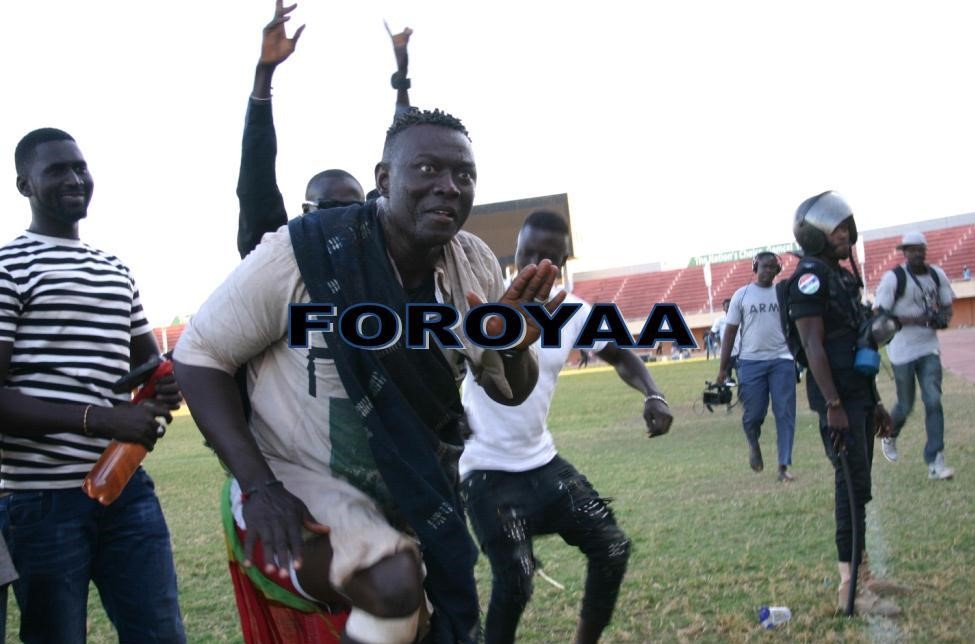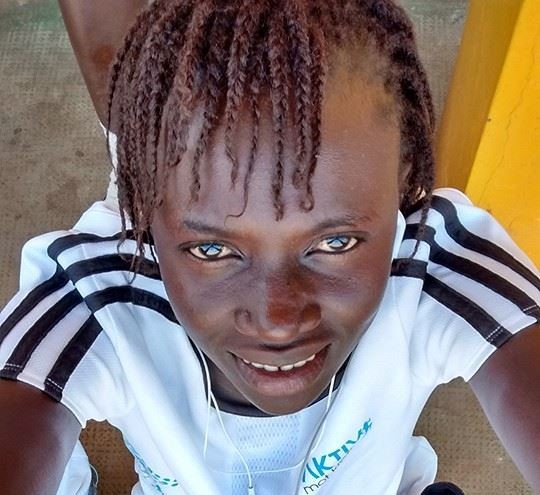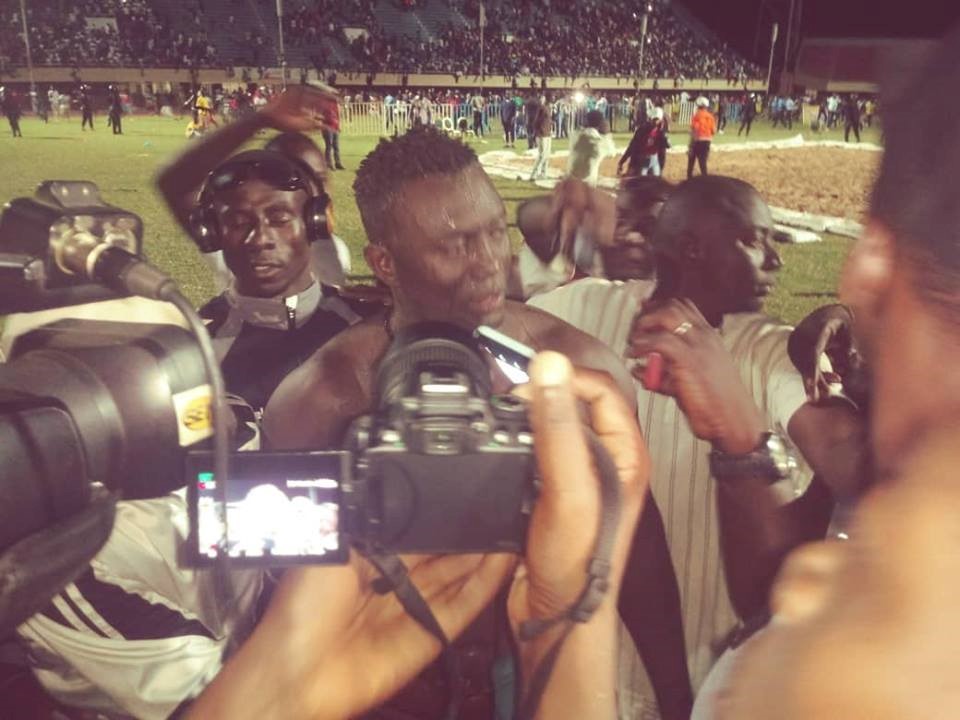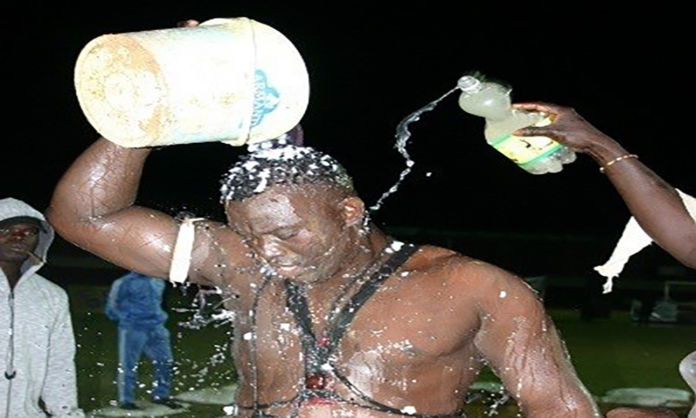By Sulayman Bah
Hoyantan is a celebrated figure in The Gambia, a tiny West African nation with a teeming population of two million.
At six-foot six-inch, his gigantic frame easily sets him apart from the crowd. For a man of his personality and Gambia wrestling’s King of Arena, he lives in a crowded Kunkujang town, a near one hour’s drive from the hustle and bustle of the country’s administrative capital, Banjul. A narrow path cuts from the area’s main tarred road leading to his home. On entrance, is an iron-welded gate completed by a row of flats housing no more than ten people with a loaded truck packed to the side. Outside of the complex’s pavement is a horde of his blokes whom he was chatting with before moving into the inner room upon learning of my impending arrival. The premises is usually flooded with people from all walks of life in show of solidarity on a combat day.
A television sound booms in the background. Hoyantan is flung to one side of a double upholstered sofa with his manager Ndongo Ceesay patched on the right cooing a crying child.
Sporting sprouting mini dreadlocks with a multi-coloured white summer shirt complimented by a marching short, Hoyantan readjusts to rise and later led us to the veranda for start of the interview.
‘I can’t remember the number of victories I have both in the arena and in freestyle,’ he said for a start, suggesting he had been in the art well before the reinvention of wrestling in the Gambian in which the use of fist is now allowed, a sport only resurrected seven years ago following a near ten-year of dormancy largely down to poor sponsorship. The game’s fortunes turned for the better in 2012 after a vigorous media campaign. In six months, the tentacles spread, leapfrogging football as the African nation’s favoured discipline.
Hoyantan is one of those reaping the rewards of being the best paid stars of the arena having still stuck around during the game’s darkest times.
There is that social recognition to enjoy, cruising around as a celebrity – an unmistakable figure in both Gambia and its neighbouring country Senegal. On an upside, he is billed to fight a Senegalese one-time great Baye Mandione this September in a deal that has earned him his biggest paycheck to date as he aims making a breakthrough in the arena in Dakar where wrestling is a multi-million dollar sport.
A downside to this though is, the combat is stalling, becoming a protracted affair with a date yet to be decided by the fight promoter who is being dogged by some social setbacks.
‘There have been some developments registered in Gambian wrestling but there have also been hiccups too such as there aren’t much combats being signed (match drought). I could only fight once or twice in the year.
‘A combat takes usually four to three months in preparation as we incur a lot of expenses,’ he says.
Traditional wrestling fused with fist-fighting is popular around the Senegambia region. It is religiously followed by locals and is more than just an Olympic sport. Its actors are considered role models. Aside from the show of masculinity and display of strength, it also involves mysticism, voodoo and, to some extent, offering sacrifices based on directives of a plethora of marabouts and soothsayers. The significance of black magic including tying of knots, dousing in prepared concoctions and using body parts of animals for protection, is quite manifest in the sport in this part of the globe.
Although a predominantly Muslim sub-region, most are convinced the inclusion of charms work the magic of helping wrestlers emerge victorious so much so that wrestlers spend a better chunk of their prize monies on superstition. Hoyantan is one of those with a strong conviction voodoo amulets have a place in the art, insisting a wrestler risks facing severe consequences at disregard of it.
Backing up his belief, he narrates an incident of how an opponent’s spell affected him claiming it nearly cost him a defeat in a duel later ending a stalemate. It was his toughest game, he says.
That clash saw Hoyantan ooze blood, sustaining a nasty-like cut in the face prompting the arbiter to halt the match as medics tried to stop the bleeding on two occasions.
‘My toughest bout was my combat with Yaya Jammeh of the Gambia Police Force Wrestling Club. I did not prepare well for the fight and this affected me greatly. Superstition was part of it and it affected me.
‘Before that deal was sealed, my management never told me who I was facing and it wasn’t until much later when I got to know my opponent after the first payment had already been done by the fight promoter. Being obedient, I accepted to fight in good faith. It ended a draw and I won him in the rematch,’ he told Foroyaa Sport.
A Humble Beginning as a Farmer
Like most from provincial Gambia, Hoyantan hails from a poor background where feeder roads can only be heard of in the capital with poor electricity supply if any. Cultivation of crops is majority’s source of livelihood and Hoyantan’s family are no exception. Being a kid at the time, he followed his father’s way, helping out in the farm using income from sale of produces to cater for family needs.
He would head out to the farm to tilt the land fusing it with animal dung to enhance its fertility, laying the ground for crop production at approach of the rains each year.
Cultivation of crop follows, then weeding after the groundnut has sprouted and nearing its harvesting period.
‘I go to the farm. I have done that for my survival. We cultivated crops, cleared and ploughed hectares of lands especially during the rainy season. Like, all jobs, it wasn’t easy. It was a source of livelihood and I have no regrets doing that,’ he says, drawing closer from his initially leaned posture.
He continued: ‘I have even worked as a mechanic short of unloading various machines but farming took precedence and was our means of survival and we made ends meet with it before my trip to the capital. We grew crops to feed us and did anything else that got us something to live on.
‘Farming is a noble profession and could fetch money just like wrestling –both serve as a means of livelihood.’
In the middle of all this and for youthful exuberance, he would venture into trade of being an apprentice for car mechanics in order to learn a skill which for most of the day’s work, involved disfiguring and repairing engines of various machines.
The night presented a different ideal in the dry season. Wrestling matches are arranged with cows or bags of rice placed as staked prizes. This occurred in either neighbouring hamlets or within Hoyantan’s home village, Balangarr. Camp fires are lit to illuminate the wrestling circle ground aided by the hovering moonlight amidst melodies from regiment of feverishly beaten drums. Hoyantan competed in these informal wrestling bouts winning prizes in various settings.
The mammoth Gambian champion takes great pride in what he does now, provoking the question of how his sobriquet “Hoyantan” came about.
His hand travelling to his neck as if to rid himself of a fly perching there ,he smiled showing an immaculate set of teeth, amused at the question.
‘I named myself after a wrestler who competed in our home town. For some reasons, I just liked him and before I knew it, everyone began calling me Hoyantan. But back then, I knew I was going to become a wrester.
‘The first wrestler I faced -It was a different case when he defeated me but I knew I was going to revenge that defeat and I did when the time came. I smacked him down till he fainted. I have done and seen a lot in the sport. I was young vicious towards my opponents. I will probably pin that down to youthful exuberance. Any opponent I would face, I’d like to leave a mark on them that would make them remember me. However, I have matured and no longer do that. Now I’m only interested in winning and that’s what counts,’ he elucidates.
Taking up Sport as a Livelihood
Produce from the farm yielded little to continue surviving on and Hoyantan felt he has had enough and longed for a change of scenery –one that would also fetch him enough money.
His first port of call was a trip to the capital city and Ndongo Ceesay, his manager, became his host there.
Wrestling in the towns is more of a business enterprise. Coalesced with boxing, different from the conventional free styling version of the ones staged in the village, Hoyantan did not hesitate to throw his cap in the ring with loftier prizes on stake and cash to spend from companies as sponsors.
Here, adequate lights are lit with generators fuelled to the brim on standby in the event of an outage. Football parks are used as makeshift wrestling venues. Arriving an unknown in the arena, Hoyantan needed to do some proving to interest promoters to sign him and it didn’t take him long to do that when the chance finally came. His first bout was against Tass-sa-yaram, a feared heavyweight with incredible following in Serekunda –a burgeoning populous city just before then dictator Yahya Jammeh slapped a temporary ban on the sport.

Behind the scenes of Hoyantan’s meeting with Tass-sa-yaram also dubbed Tass, is tales of rows. Unbeknown to the public, the two had met before and fought on many an occasion in remote places away from the glares of cameras.
Hoyantan went public with his previous encounters with Tass, claiming he had beaten him severally. Aware he risked losing popularity in the wake of his challenger’s allegations, Tass repudiated the claims, dismissing them as too good to be true. This set the pattern as tongues wagged. Promoter M and B took onus of signing the pair to a deal on a then record fee. The hype around the fight was unprecedented, from phone-in radio shows to the nation’s sole wrestling television programme.
Adding to the spiraling euphoria, the contestants brawled behind the scenes of virtually all their public face-to-faces to the extent that a barricade had to be stationed in the lead up to their final weigh-in amid simmering tension
Hoyantan secured the bragging rights when the D-day came, sending to raptures the thirty thousand strong sold out crowd to tumultuous celebrations.
That win had the top wrestlers within the tiny West African country’s top division sitting up and taking notice of the outsider making buzz in town.
Hoyantan admits there will never be a fight like the one with Tass in recollection of happenings on that night.
‘There will never be a combat like the one I had with Tass-sa-yaram,’ he says.
‘I and Tass have met in a number of places and fought and I defeated him on each occasion. There was a time we fought in the heart of the market too, during a one-on-one at the radio station, you name it –all places.
‘The one before our previous fight, I bundled him down but there were doubts and lot of talk. So we were signed by a promoter to have a clarification combat. ‘At the time, he had a huge support base in Serrekunda and I defeated him before a packed Independence Stadium. It is a victory I am proud of. After that, we no longer became arch rivals for the crown. I even paid him a visit at his home in the immediate aftermath of our fight and we had a nice time together. That’s the spirit of the game!’
Consequently, Hoyantan became a sough-after character with a raft of promoters proposing challengers to him as his stock rose. Bookings on TV and radio shows became a frequent occurrence, cakewalking him into stardom overnight but with a meticulous manager to look after his career. He insists he does not suffer from none of the false affectations or regular outburst of outrageous ego that so often infest a major celebrity.
Not Quitting Wrestling for an uncertain Future in Europe
Gambia was virtually an island of broken dreams four years ago when a huge population of its youth cohort ventured into an exodus to Europe via the perilous journey by boat.
This voyage was taken by people fearing persecution under the iron fist grip of erstwhile president Yahya Jammeh but most made the risky trip for economic reasons having grown distraught over soaring unemployment rate in the country.
The sport sector was hit the hardest by the exodus with athletes, footballers and wrestlers paying people-smuggling boats using hot-spot Libya as a transit point to reach destination Italy, Malta or Germany.
Few have gone on to succeed having entered Europe through the waves, returning to build duplexes back home but casualty rate too remain at fever pitch.
Boats, in some instances, have capsized resulting to deaths at sea prominent among such victims is Gambia women’s national team goalkeeper Fatim Jawara and Mill Franc, a wrestler whose demise in 2016 hugged international headlines.

Wrestler Tassa-yaram took the voyage using funds generated from his fight with Hoyantan and is reported to be a migrant in Berlin, according to sources.
Grilled whether he has ever attempted quitting the sport to make the perilous trip in the quest for pastures new in Europe, Hoyantan, christened Abdoulie Ndow, said: ‘I have really never supported the Back Way (a local parlance for undertakers of boat voyage to Europe).
‘Of course those who took the perilous sea journey want the best for themselves. I am one of those who believe in achieving my dreams here (in The Gambia). It is the difficulty of life that forced them into resorting to the trip. However, I think anyone who stayed here and still hustling is worthy of being respected.
‘I have a friend who tells me there (in Europe) is difficult and nice as well. What you learn from this is, nothing is easy. For me those who took off from home and left via the Back Way are, definitely in my opinion, not man enough.’
Claiming Gambia’s King of Arena Crown
Today, Abdoulie is a revered personality after snatching the sport’s crown from Yankuba Badjie known to most fans as Leket Bu Barra, Gambia former national team wrestling captain. This achievement, he admits, is borne out of his decision to shun temptation of taking the journey to Europe.
‘I like many others could have made the Europe trip but I chose to stay and I will say it’s self-belief through wrestling that got me where I am today,’ he said.
He swaggered over the likes of Action another wrestler, Yahya Jammeh in a rematch and “Gambien” to set him up with a mandatory title battle with Leket Bu Barra.
Thousands trooped into the stadium on night of the title decider. Reporters from various Senegalese media outlets touched down in Banjul to cover the fight before a sold out noisy crowd in Bakau, a forty minute’s drive from the presidential villa. Mysticism was in excess manifest as both wrestlers doused in their assembled bottles and pans of magic concoctions at the centre circle.
Whistle of start by the referee saw the two adversaries facing off. Abdoulie (Hoyantan) feigned a deaf move but Badjie kept still before retreating at edge of the arena from an advancing Hoyantan following a two minutes of drab hand swinging. Hoyantan threw a punch ready for a fist fight as a game plan but Leket dived noticing his opponent isn’t keen on grappling. Emboldened by Leket’s uncharacteristic continuous retreating, Hoyantan kept mounting up pressure on his opponent who incurred four warnings for wandering out of the circle. The pattern did not change at end of allocated time with Leket running around to the fringes. Hoyantan was declared winner on basis of cautions incurred by his challenger who was tasting defeat for the first time in his career.

The fanfare that followed jubilation of Hoyantan’s crowning as king of the arena on the same night was electrifying as vehicles, filled with his supporters, stormed the streets in celebration.
‘Leket was just running around. I pressured him to get him to fight but he wasn’t interested. Thank goodness I won and it’s real pleasure being crowned king of the arena. It is something I am obviously proud of and a dream come true,’ he tells Foroyaa Sport.
Today, Hoyantan is a respected figure six years after he had left his home town searching pastures new. With fighting skills nurtured from his sport-obsessed village, he has found not only fame but a well-paying livelihood through wrestling, enough to cater for his family.
















